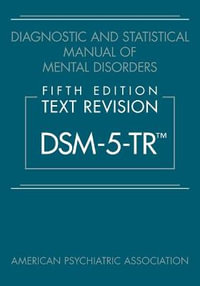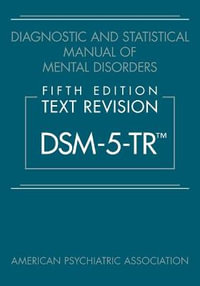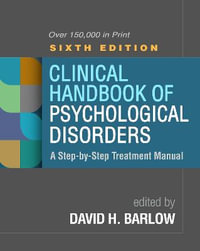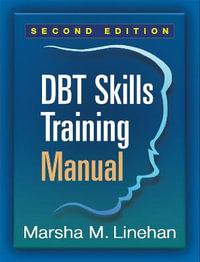
At a Glance
208 Pages
20 x 15.5 x 2
Paperback
RRP $69.95
$61.50
12%OFF
or 4 interest-free payments of $15.38 with
orAims to ship in 5 to 10 business days
Ethical Practice in Applied Psychology helps prepare Australian students for registration through an exploration of ethical principles, providing the basis for psychological practice.
Written to align with the Australian Psychological Society's Code of Ethics, this book offers a clear and accessible explanation of the Code and its subsequent guidelines. Case studies throughout help students learn how to apply the Code to real scenarios, provide a theoretical context to ethical situations and provoke discussion of issues relating to ethical dilemmas.
With an engaging writing style and clear structure, Ethical Practice in Applied Psychology provides students with a deep and clinically useful education in ethics and empowers them to make ethical decisions in the transition to practice.
Key features
- Based on the Australian Psychological Society's Code of Ethics and Ethical Guidelines
- Excellent case examples bring the complexities of ethical decision-making to life
- Encourages best practice with a focus on scenarios where good practice is exemplified
- Key terms, margin notes and questions to consider support student learning
Industry Reviews
1. Why Bother with Ethics?
Introduction
General perception of psychologists
The APS Code of Ethics
Ethics, the law and morality
An ethical code in practice
Chapter summary
References
2. The Three Keys to Ethical Practice: Competence, Confidentiality and Consent
Introduction
Competence
Confidentiality
Informed consent
Chapter summary
Questions to consider
References
3. Decision Assistance Model for Australian Psychologists
Introduction
Ethical decision-making
The Decision Assistance Model for Australian Psychologists
Chapter summary
Questions to consider
References
Part 2: Managing Boundaries and Working with Groups
4. Managing Professional Boundaries
Introduction
Multiple and dual relationships
Boundary crossings and violations
Power imbalance
Non-exploitation of a client
Chapter summary
Questions to consider
References
5. Working with Clients who Cannot or Do not Give Consent
Introduction
Clients who cannot give consent
Clients who do not consent to services
Other issues when working with clients who may not be able to give consent
Chapter summary
Questions to consider
References
6. Diverse Clients
Introduction
Client diversity
Competence with diverse client groups
Communication
Chapter summary
Questions to consider
References
Part 3: Clients who Pose a Risk to Themselves or Others
7. Working with Clients who Pose a Risk to Themselves
Introduction
Clients with suicidal ideation
Self-harm and behaviours that place the client at risk
Dangerous or risky client behaviour that endangers the client
Chapter summary
Questions to consider
References
8. Working with Clients who Pose a Risk to Others
Introduction
Clients who pose a risk to others
Legal and ethical issues when working with a client who poses a risk of harm to third parties
Client criminal activity
Legal and ethical obligations in relation to suspected child abuse or abuse
of other vulnerable groups
Potential risk of harm to psychologists from clients
Chapter summary
Questions to consider
References
Part 4: Two Spheres of Practice: Research and Assessment
9. Ethical Issues in Research
Introduction
The APS General Principles
Shock at La Trobe University, 1973
Gauging risk and the NHMRC National Statement
Duty of care and non-maleficence
Informed consent
Coercion, inducement and deception
Conflict of interest
Reporting and publication of results
Vulnerability
Milgram’s experimental legacy
Chapter summary
Questions to consider
References
10. Ethical Assessment and Intervention
Introduction
Psychological assessment
Psychological testing
Cultural diversity and testing
Psychological assessment reporting
Intervention
Therapies involving psychologist–client physical contact
Group therapy
Chapter summary
Questions to consider
References
Part 5: A Guide to Gaining and Maintaining Registration, and the Ethical Issues in Professional Practice
11. Clinical Practice: Privacy Legislation, Records, Delegation, Advertising and Finances
Introduction
Client records
Privacy
Structure of client records
Ownership of client records
Access to the client record
Storage of client records
Office workflow
Termination of service
Service delegation and other professionals
Advertising
Financial limitations
Chapter summary
Questions to consider References
12. Gaining and Maintaining Registration
Introduction
Pathways to becoming a registered psychologist
After registration
Practice endorsements
Chapter summary
Questions to consider
References
Appendix Annotated APS Code of Ethics
General Principle A: Respect for the Rights and Dignity of People and Peoples
General Principle B: Propriety
General Principle C: Integrity
ISBN: 9780195523102
ISBN-10: 0195523105
Published: 13th May 2014
Format: Paperback
Language: English
Number of Pages: 208
Audience: College, Tertiary and University
Publisher: Oxford University Press ANZ
Country of Publication: AU
Dimensions (cm): 20 x 15.5 x 2
Weight (kg): 0.58
Shipping
| Standard Shipping | Express Shipping | |
|---|---|---|
| Metro postcodes: | $9.99 | $14.95 |
| Regional postcodes: | $9.99 | $14.95 |
| Rural postcodes: | $9.99 | $14.95 |
How to return your order
At Booktopia, we offer hassle-free returns in accordance with our returns policy. If you wish to return an item, please get in touch with Booktopia Customer Care.
Additional postage charges may be applicable.
Defective items
If there is a problem with any of the items received for your order then the Booktopia Customer Care team is ready to assist you.
For more info please visit our Help Centre.
You Can Find This Book In

Diagnostic and Statistical Manual of Mental Disorders 5/e TR (DSM-5-TR)
Diagnostic and Statistical Manual of Mental Disorders
Hardcover
RRP $347.00
$306.90
OFF






















